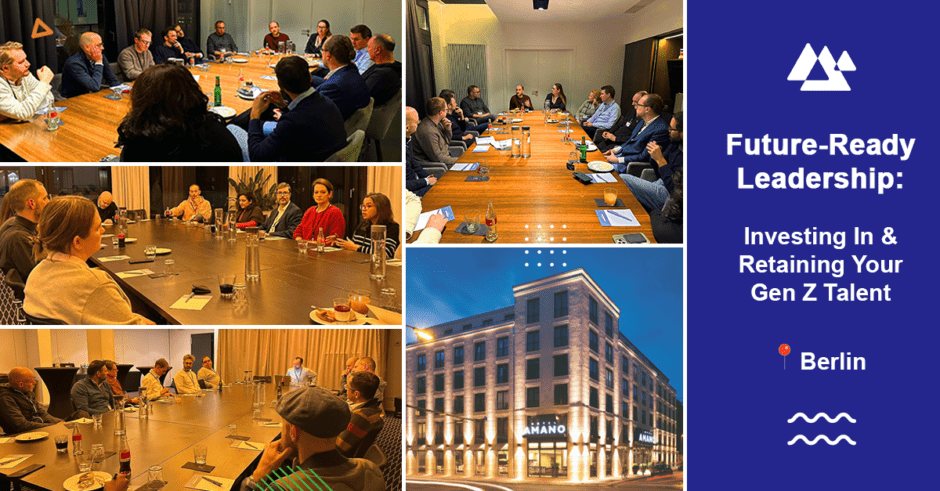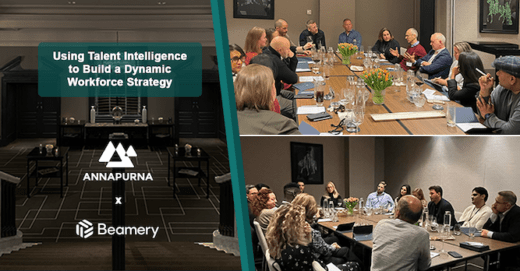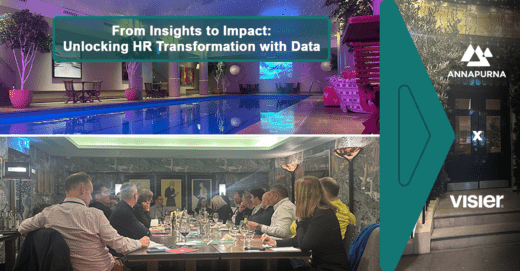It’s estimated that Gen Z talent makes up around 27% of the global workforce right now and by common logic, that’s only going to rise as time goes by.
With this in mind, businesses are quickly realising the need to adapt their ways of work to create an environment that suits a multi-generational workforce and opens the door to mass collaboration.
Our recent and first VIP roundtable event of 2025, hosted in Berlin saw us bring together over 50 leaders from the HR, Tech and GTM divisions across three rooms for a discussion on ‘Future-Ready Leadership: Investing In and Retaining Your Gen Z Talent’.
Our esteemed attendees discussed the challenge of more Gen Z talent entering the workplace in detail, some with success stories to share, but the majority seeking validation amongst other top professionals of the challenges they’re experiencing. Collectively, they identified some fantastic insights which pointed to three key takeaways:
1. It’s about purpose, not perks
2. Approaching workplace communication with a digital-first mindset
3. Job titles aren’t enough, we want real progress
It’s about purpose, not perks
An area all our attendees agreed on immediately was how noticeable the shift in social responsibility is within Gen Z compared to other generations. They care deeply about the world they live in and the legacy they leave behind. Unlike previous generations, whose workplace choices were often influenced by salaries, benefits, and office perks, Gen Z prioritizes a company’s mission, social impact, and workplace culture.
This creates a complex challenge for reward & benefits managers as they grapple with how to offer a range of packages that suit different sets of employees in a way that best captures their needs/ wants. Traditional rewards and benefits packages have long been designed to cater to individual needs with things such as health insurance, gym memberships, and flexible working arrangements. However, Gen Z has reshaped this approach.
They are less concerned with individual perks and more focused on how a company’s values align with their own.
As a result, reward managers are shifting their strategies to create benefits packages that emphasise community impact, sustainability initiatives, and social responsibility.
If businesses want to attract and retain Gen Z talent, they need to embed purpose into their employee value proposition. It’s no longer just about ‘what’s in it for me?’ but rather ‘what’s in it for the world?’
Changing the face of workplace communication with a digital-first approach
Communication with employees has always been an essential contributing factor to success in businesses. But with more Gen Z talent entering the workplace now, creating personalised communication methods for different sets of employees to meet them where they are is critical.
Gen Z’s digital-first approach to all aspects of life has seen them adopt different methods to that of older employees with the easiest example being their use of Slack or Teams over email for in-house comms. No longer can we rely on sending a mass email and reaching all areas of the business on time, instead, Gen Z talent seeks real-time communication.
Without meeting talent where they are, you run the risk of creating a disjointed workforce that isn’t on the same wavelength.
Forget job titles, real career progress is what we want
A common misconception is that Gen Z lacks motivation or a strong work ethic. However, our attendee’s discussions revealed quite the opposite. They emphasised that Gen Z is highly ambitious and that the misconception comes from the fact that they define career growth differently from previous generations.
Rather than chasing job titles or traditional promotions, Gen Z values skill development and meaningful career progression. They see career growth as a dynamic journey, one that isn’t necessarily linear.
The traditional ‘corporate ladder’ has evolved where sideways moves, skill acquisitions, and cross-functional experiences are just as valuable as upward mobility.
For employers, this means rethinking career development frameworks. Providing clear pathways for skill enhancement, mentorship, and genuine growth opportunities will be far more effective in retaining Gen Z talent than simply offering a higher title. They are more interested in long-term, meaningful progression than short-term gratification.
Final Thoughts
The future workforce is already here, and Gen Z is shaping it in new and exciting ways.
Investing in Gen Z isn’t just about making them fit into existing structures. It’s about evolving workplaces to meet their expectations and values. Those who embrace these changes will not only future-proof their talent strategies but will also build a workforce that is more engaged, motivated, and aligned with the challenges of tomorrow.
Unsure if your current workplace is fit for multi-generational work and specifically Gen Z talent? We can help by performing a talent and workplace audit. Click here to get the conversation started.



